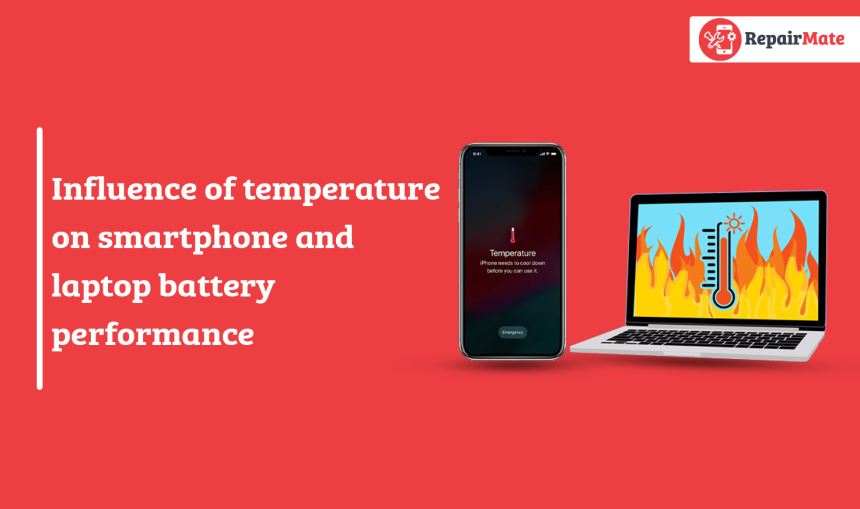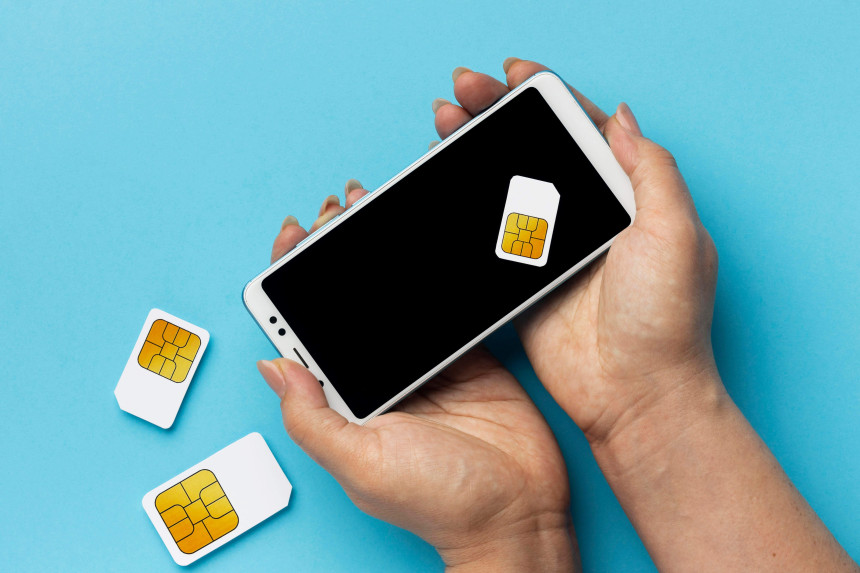
How Does Temperature Affect Smartphone and Laptop Battery Performance?
Modern smartphones and laptops are powered by lithium-ion batteries, renowned for their energy density and rechargeability. However, these batteries are sensitive to temperature fluctuations, and understanding the nuances of these effects is essential for device users and repair professionals alike.
The Basics of Battery Chemistry
To comprehend how temperature impacts battery performance, it's crucial to grasp the underlying battery chemistry. Lithium-ion batteries consist of cathodes, anodes, and electrolytes. During charge and discharge cycles, lithium ions move between these components. Temperature influences the speed of these reactions, thus affecting overall battery performance.
Also Read: How to fix iPhone Battery Problems
Effects of High Temperatures on Battery Performance
Reduced Capacity
When temperatures rise, so does the pace of chemical reactions inside your device's battery. These reactions are essential for the flow of energy that powers your device. However, the downside of this heightened activity is that it leads to faster energy drain. In practical terms, this leads to reduced battery capacity, a term that signifies how much energy the battery can hold and subsequently provide to your device. As temperatures climb, your battery's capacity takes a hit, which, in turn, prompts more frequent charging sessions to sustain your device's functionality.
Increased Self-Discharge
Imagine you fully charge your smartphone or laptop and set it aside for a day or two. You pick it up, only to find that the battery level has inexplicably dropped, even though you haven't used it. This phenomenon is known as self-discharge, where a battery loses its charge over time without any external use. High temperatures exacerbate this issue. The elevated heat accelerates internal chemical reactions, causing the battery to self-discharge at an amplified rate. The result? A shorter battery life even when your device is inactive, a scenario that can significantly impact standby times and the convenience of having a reliable device at hand.
Accelerated Aging
Consider your device's battery as a finely tuned orchestra of chemical processes. Just as excessive heat can strain musicians and instruments, it places immense stress on the intricate components of your battery. Heat, over time, contributes to the gradual aging of the battery. The cathode and anode materials within the battery structure begin to deteriorate at an accelerated pace due to the intense energy of the chemical reactions spurred by heat. This degradation, although gradual, accumulates over time, resulting in a battery that not only holds less charge but also exhibits reduced overall lifespan. In essence, the battery ages faster in the presence of excessive heat, a reality that underscores the importance of temperature management.
Also Read: How to Fix Sound Issues on an Android
The Importance of Battery Replacement
By choosing battery replacement, you extend device longevity, ensure consistent performance, and contribute to a more sustainable future by reducing electronic waste As your trusted device partner, we recognise the pivotal role smartphones and laptops play in your life. Over time, batteries naturally lose their vigor, leading to reduced performance, shorter battery life, and unexpected glitches. Our battery replacement service offers a revitalising solution, breathing new life into your device. Let us be your ally in keeping your devices running seamlessly, ensuring they remain reliable companions for your everyday adventures.
Does Overheating Drain Laptop Battery?
Yes, overheating can indeed have a draining effect on your laptop's battery. When a laptop overheats, it places an extra load on its components, including the battery. Excessive heat can cause the battery's chemical reactions to occur at an accelerated rate, leading to faster energy drain and reduced battery life. Additionally, prolonged exposure to high temperatures can contribute to battery degradation over time, further impacting its overall performance and capacity. In essence, keeping your laptop cool is not only crucial for its overall health but also for preserving the longevity and efficiency of its battery.
Check Out: What to do when your laptop overheats
Is It Worth Replacing My Phone Battery?
Absolutely, replacing your phone battery can be a highly worthwhile investment. As phones age, their batteries naturally degrade, leading to decreased battery life, slower performance, and unexpected shutdowns. By opting for a battery replacement, you can restore your phone's vitality and functionality. You'll experience improved battery life, better performance, and a device that can keep up with your demands. This cost-effective solution not only saves you from the hassle of frequent charging but also extends the lifespan of your device, offering you more value and reliability in the long run.
Effects of Low Temperatures on Battery Performance
Slower Chemical Reactions
As the mercury drops, so does the pace of the chemical reactions occurring within your device's battery. The intricate dance of ions and electrons that produces the energy needed to power your device becomes sluggish in the cold. This can lead to a reduction in the battery's ability to deliver power promptly, especially during moments of high demand. The result? A device that might feel a bit lethargic in its response, struggling to keep up with your commands during colder spells.
Temporary Voltage Drop
Picture this: you're out and about in the cold, relying on your smartphone for directions, when suddenly, the device shuts down unexpectedly. What just happened? At low temperatures, batteries can experience a temporary voltage drop. This means that the voltage supplied by the battery dips, potentially causing the device to shut down abruptly. However, there's a silver lining: as the battery warms up, it often regains its voltage and power, allowing the device to spring back to life.
Capacity Degradation in the Long Run
While a brief chill might not seem like much cause for concern, prolonged exposure to cold temperatures can have lasting consequences. Just as chronic exposure to harsh weather can take a toll on a building's exterior, it can also affect a battery's capacity over time. Cold temperatures slow down the battery's internal chemical reactions, leading to a gradual erosion of its capacity. This means that, over the long term, your battery's ability to hold a charge diminishes. While the effects might not be immediately apparent, they can add up over the battery's lifespan, potentially resulting in a device that struggles to stay powered.
Also Read: Why is My iPhone charging Slowly?
Ideal Temperature Ranges for Battery Performance: The Goldilocks Zone
Imagine a temperature range where your device's battery performs at its peak. Welcome to the Goldilocks zone of battery operation. For optimal battery health and performance, it's advisable to use your devices within the temperature range of 20°C to 25°C (68°F to 77°F). This range provides the sweet spot where chemical reactions within the battery can occur efficiently, enabling optimal power delivery and overall longevity. Straying too far from this temperature range, whether it's too hot or too cold, can have negative repercussions on battery performance and lifespan.
Practical Tips to Mitigate Temperature Effects
Avoiding Extreme Temperatures
One of the most effective ways to mitigate the impact of temperature on your device's battery is to avoid exposing it to extreme conditions. This means steering clear of leaving your device in direct sunlight on a scorching day or leaving it in a freezing car overnight. By minimising your device's exposure to temperature extremes, you reduce the stress on its battery and help preserve its overall health and longevity.
Proper Storage
When you're not actively using your device, consider how and where you store it. Prolonged exposure to extreme temperatures during storage can have lasting effects on the battery's performance. To combat this, power down your device and store it in a cool, dry place. This practice prevents the battery from enduring unnecessary temperature stress, contributing to its overall well-being over time.
Protective Cases
Ever noticed your device heating up when you're using it extensively? This heat build-up can also impact your battery's temperature. Consider investing in a high-quality protective case designed to dissipate heat. These cases not only offer physical protection to your device but also help regulate its temperature during usage and charging. By providing a cooling mechanism, such cases can mitigate the effects of temperature-related stress on your battery.
Also Read: Top iPhone 15 Accessories you Must Have
How To Monitor Battery Temperature on Smartphone and Laptop
Monitoring battery temperature is a proactive approach to understanding how your device's battery is faring and taking timely action if temperatures start to become concerning. Here's how you can do it on both smartphones and laptops:
On Smartphones
Built-in Features: Many modern smartphones come equipped with built-in battery monitoring features. Navigate to your device's settings and look for a "Battery" or "Device Care" section. Within this section, you'll likely find information about your battery's temperature along with other usage details.
Third-Party Apps: There are numerous third-party apps available on app stores that allow you to monitor various aspects of your smartphone, including battery temperature. Search for apps like "Battery Monitor" or "Device Temperature" and read reviews to find a reliable one.
On Laptops
Operating System Tools: Most laptops have temperature monitoring tools built into their operating systems. For Windows laptops, you can access the "Task Manager" (Ctrl + Shift + Esc), navigate to the "Performance" tab, and monitor the CPU temperature. On macOS laptops, use the "Activity Monitor" to check temperature under the "Energy" tab.
Third-Party Software: There are specialised software applications available for monitoring your laptop's temperature in more detail. Programs like "HWMonitor" or "SpeedFan" provide real-time temperature readings for various components, including the battery.
In the intricate world of smartphone and laptop battery performance, temperature plays a pivotal role. Both high and low temperatures can lead to decreased battery life, capacity, and overall efficiency. By understanding these effects and implementing simple temperature management strategies, users can maximise their device's longevity and performance.
Check Out: iPhone Camera Not Working? Try these Fixes
FAQ
Q: Can exposure to extreme temperatures result in permanent battery damage?
A: Yes, prolonged exposure to extreme heat or cold can lead to irreparable damage to your device's battery, negatively impacting its performance and longevity.
Q: Are certain smartphone models more resilient to temperature changes?
A: While some models might exhibit slightly better tolerance to temperature fluctuations, all lithium-ion batteries are sensitive to extreme temperatures.
Q: Can I store my device in the refrigerator to prevent overheating?
A: Storing your device in the refrigerator is not recommended. Rapid temperature changes, like those experienced when removing the device from the refrigerator, can lead to condensation inside the device, potentially causing damage.
Q: Why does my phone shut down in cold weather even when the battery isn't empty?
A: Cold temperatures can cause a temporary drop in battery voltage, leading to unexpected shutdowns. The device should power up again as it warms up.





